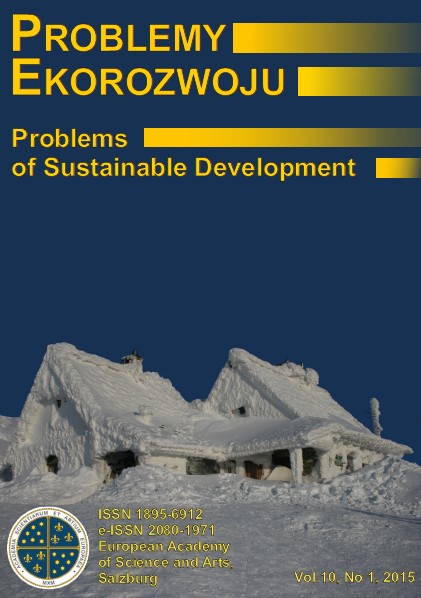Uneven Integration and Blocked Spillovers: Why Environmental Governance in Northeast Asia does not Converged to the EU Model?
Article Sidebar
Issue Vol. 10 No. 1 (2015)
-
Sustainable Development Integrated in the Concept of Resilence
Jürg Bloesch, Michael von Hauff, Klaus Mainzer, S. Venkata Mohan, Ortwin Renn, Verena Risse, Yonghui Song, Kazuhiko Takeuchi, Peter A. Wilderer7-14
-
Uneven Integration and Blocked Spillovers: Why Environmental Governance in Northeast Asia does not Converged to the EU Model?
Liang Dong15-20
-
The Issue of Environmental Resources Management in the Light of the Model of Tragedy of the Commons – Systemic Approach
Mariusz Dacko21-30
-
Religion versus Sustainable Development. The Problem of Human Eco-development in the Teachings of John Paul II and Benedict XVI
Artur Niechwiej SI31-40
-
Environmental Regulations and Industrial Performance Evidence from the Revision of Water Pollution Prevention and Control Law in China
Wei Yu, Qiang Chen41-48
-
Sustainable Development as Seen by the Residents of Eastern and Western Europe on the Basis of ISSP Environment Data
Paweł Rydzewski49-53
-
Biofuel’s Sustainable Development under the Trilemma of Energy, Environment and Economy
Heqing Liu55-59
-
Joseph Kozielecki’s Concept of Transgressive Man and the Problems of Sustainable Development
Marek Tański61-66
-
A Process Model of Building Sustainable Competitive Advantage for Multinational Enterprises: An Empirical Case Study
Mengmeng Shan, Jianxin You, Yulu Wang, Huchen Liu67-78
-
The Development of Organic Food Market as an Element of Sustainable Development Concept Implementation
Paweł Bryła79-88
-
Challenges to Sustainability of Resource-exhausted Cities: A Case Study of Lengshuijiang, China
Guocun Zuo, Qiang Chen89-98
-
Application of Environmental and Social Sustainable Measures by Port of Koper: The Basis for the Regional Approach
Bojan Beškovnik, Patricija Bajec99-106
-
The American Lawn Revisited: Awareness Education and Culture as Public Policies Toward Sustainable Lawn
Yaoqi Zhang, Bin Zheng, Ge Sun, Peilei Fan107-115
-
Sustainable Mitigation of Methane Emission by Natural Processes
Cao Yucheng, Wojciech Cel117-121
-
Sustainable Bridge Design
Sławomir Karaś, Janusz Bohatkiewicz123-132
-
Book Review: How to Teach on Sustainable Development Issues? G Venkatesh, Water For All and Other Poems, Cyberwit.Net, 2014
Artur Pawłowski133
Archives
-
Vol. 12 No. 2
2017-07-03 18
-
Vol. 12 No. 1
2017-01-02 16
-
Vol. 11 No. 2
2016-07-01 17
-
Vol. 11 No. 1
2016-01-04 20
-
Vol. 10 No. 2
2015-07-01 17
-
Vol. 10 No. 1
2015-01-05 16
-
Vol. 9 No. 2
2014-07-01 16
-
Vol. 9 No. 1
2014-01-02 19
-
Vol. 8 No. 2
2013-07-01 13
-
Vol. 8 No. 1
2013-01-02 12
Main Article Content
Authors
Abstract
The EU environmental governance is recognized as an effective path to the management of regional environment. This model is based on rules, directives, top-bottom coordination and also in the characteristics of multi-level governance, which has become an example for various regions to imitate in the world. By contrast, environmental governance in Northeast Asia, equally with a strong demand in dynamic cooperation, failed to deal with the increasing environmental problems and it also doesn’t converge to the EU environmental governance over the years. Instead, it established a non-binding cooperation in nature. The Northeast Asia model is a kind of cooperation lack of effectiveness, coordination between regional environmental regimes, without a stable financial arrangement for each cooperative initiative, mainly dominated by the governments, and also lacking of other actors involved in environmental issues. This model is caused by regional security tension which changes the cooperation preference overall, nations especially between China and Japan do not share political trust in high politics. This situation makes regional environmental governance to be a more independent area, with rarely high political interference and without spillover channels to other issues. Theoretically speaking, the Northeast Asia cooperation in environment is based on inter-governmental arrangements, thus, Neo-Functionalism’s spillover effects were significantly inhibited. That means to enhance environmental governance in Northeast Asia will mainly rely on intergovernmental push in the future.
Keywords:
References
BELL S., McGILLVRAY D., PEDERSEN O., 2013, Environmental Law, Oxford University Press, Oxford, p. 210-213.
BURNS CH., CARTER N., 2012, Chapter 36 Environmental Policy, in: Jones E., Menon A., Weatherill S. (eds.), The Oxford Handbook of the European Union, Oxford University Press, Oxford, p. 512.
DAVIS CROSS M.K., 2013, Rethinking Epistemic Community Twenty Years Later, in: Review of International Studies, vol. 39(1), p. 138-139.
DOUGHERTY J.E., PFLATZGRAFF R.L. Jr., 2003, Contending Theories of International Relations: A Comprehensive Survey (5th Edition), Pearson, Chinese Edition, Beijing, p. 543-556.
KOMORI Y., 2010, Evaluating Regional Environmental Governance in Northeast Asia, Asian Affairs, in: An American Review, 37(1), p. 21.
LAURSEN F., 2012, Chapter 9 The Treaty of Maastricht, in: Jones E., Menon A. Weatherill
S. (eds.), The Oxford Handbook of the European Union, Oxford University Press, Oxford, p. 121.
SANDHOLTZ W., SWEET A.S., 2012, Chapter 2 Neo-functionalism and Supranational Governance, in: Jones E., Menon A., Weatherill S. (eds.), The Oxford Handbook of the European Union, Oxford University Press, Oxford, p. 18-19.
TAKAHASHI W., Environmental Cooperation in Northeast Asia, see at: http://pub.iges.or.jp/modules/envirolib/upload/1704/attach/neasia.pdf (28.12.2014).
VOGLER J., 2005, The European Contribution to Global Environmental Governance, in: International Affairs, vol. 81, no. 4, p. 841.
XU Q. (ed.), 2006, Zhongguo guoji quyu huanjing hezuo huibian (China International regional environmental cooperation documents), China Environmental Science Press, Beijing, p. 347.
XUE X, ZHANG H., 2013, Choices for Environmental Governance in Northeast Asia: the European Model or the Northeast Model?, in: International Politics Quarterly, vol. 3, p. 56-58.
YOON E., 2008, Cooperation for Transboundary Pollution in Northeast Asia: Non-binding Agreements and Regional Countries’ Policy Interests, in: Pacific Focus, 22(2), p. 78.
ZHANG H., 2008, Environment and International Relations (Huanjing yu guojiguanxi: quanqiu huanjing wenti de lixing sikao), Shanghai’s People Press, Shanghai, p. 35.
ZHANG H., 2008, From Absorber to Engine: The Sino-Japanese Cooperation on Environment faces Important Change, in: Shijie Huanjing (World Environment), vol. 4, p. 76-79.
Article Details
Abstract views: 70
License

This work is licensed under a Creative Commons Attribution-ShareAlike 4.0 International License.


